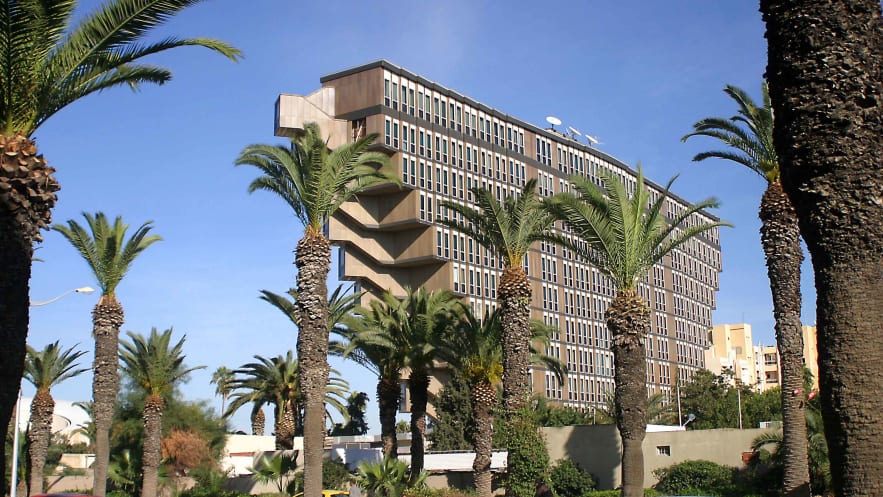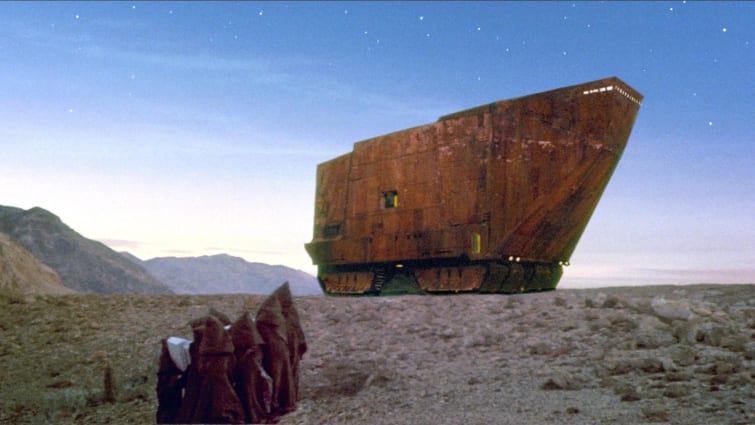The upside down hotel said to have inspired Star Wars faces demolition
Much of the shooting for the original Star Wars movies took place in Tunisia, and legend has it that one local landmark made a powerful impression on its creator, George Lucas.

The influence of Hotel du Lac in Tunis, shaped like an upside-down pyramid with serrated edges, would later be seen in the fictional Sandcrawler vehicle used by the Jawas of the Tatooine desert planet in the film.
The brutalist hotel designed by Italian architect Raffaele Contigiani features 416 rooms across ten floors of increasing width.
The du Lac enjoyed a glamorous heyday after opening its doors in 1973, with singer James Brown reportedly among its A-list clientele.
But the good times faded. The hotel closed in 2000 and has stood empty ever since.
In 2011, former President Zine El Abidine Ben Ali sold the property to the Libyan government-owned investment fund Lafico. Plans to redevelop the site were subsequently announced but never enacted.
The long period of uncertainty may now be drawing to a close.
Imminent demolition?
In February, architect and activist Sami Aloulou of the conservation group Edifices et Memoires (Buildings and memories) announced on Tunisia’s Radio Misk that the hotel was scheduled for imminent demolition.
Aloulou’s statement prompted an outcry on social media from architecture lovers.
A petition was swiftly launched to save “one of Tunisia’s premier brutalist structures – important to the country and to the world.
In response, the Municipality of Tunis announced that it had not received or granted a request for permission to demolish the hotel.
Aloulou was only partly reassured, believing that the denial merely represents a stay of execution. He claims to have visited the hotel recently and witnessed an increasing number of workers on the site.
“The danger is still present but not as imminent as we thought,” he says. “The struggle continues.”

Edifices et Memoires aims to safeguard the building’s long-term future by campaigning for greater public awareness of its historical value.
The group also plans to seek protected status from UNESCO – and possibly an intervention from George Lucas.
Twelve scenarios
Lafico did not return several CNN requests for comment on its plans for the building.
But a member of the team hired as consultants to the owners believes a final decision will be taken soon.
Architect Sahby Gorgi was hired by consultancy group BDO Tunisia to produce a range of possible plans for the site. Twelve different options are under consideration, he says. Some of these involve restoration of the existing site, but the “preference” is for “another structure.”
Gorgi says the owners are well aware of the building’s status as an “iconic symbol,” and the strength of public opinion in favor of retaining the hotel in some form.
But he adds that the building has fallen into decay after abandonment, and suffered further damage from a fire in 2011, which would make restoration costly and difficult.
Further studies are ongoing, says Gorgi. He expects a final decision in “months not years.”
Symbolic, but functional
Conservationists argue that the city, country, and region would be losing unique heritage if the building were demolished.
“(The hotel) is one of the rare standing testimonies of the brutalist movement in North Africa,” says Tunisian architect Mohamed Zitouni of the Oxxi studio. “It is maybe the unique example of this tendency in Tunisia.”
“Hotel du Lac was built as an expression of Tunisia’s modernity and independence. In contrast to the surrounding architecture, the hotel makes a rebellious statement of departure from both traditional and colonial architectural forms.”
Zitouni adds that the design featuring more rooms on the upper floors gave the building functional as well as aesthetic value.
Aloulou notes that demolition would fit a broader pattern of erasing urban heritage. The Tunisian government recently introduced a bill that would make it easier to demolish old buildings that could be considered unsafe, which could have far-reaching consequences.
“The authorities have started a campaign aiming to demolish what they consider as old, dangerous, and worthless buildings without even consulting the experts,” says Aloulou.
A second life?
Aloulou does acknowledge the case for modernization, and his group is not arguing the Hotel du Lac should be preserved in its current, deteriorated state.
Instead, conservationists are looking at new possibilities to renovate the site and give it a “second life” with a new function. One idea under consideration is for an ecosystem of small businesses.
“The Tunisian state is investing a lot in the start-up nation,” says Aloulou. “The hotel could definitely welcome a hive of start-ups.”
The coming months are likely to prove decisive as to whether an iconic building with a rich history has a future too.
View the full article here at CNN
